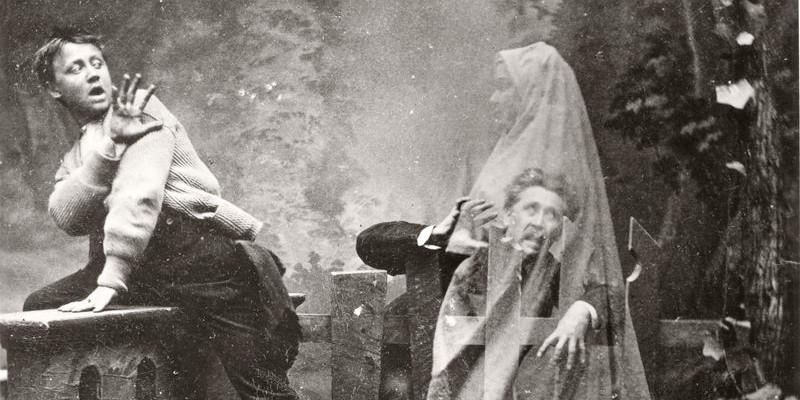Years ago, I read an article in which a journalist described living in a haunted house, and a line from the article has stayed with me ever since. It wasn’t about the bloodstain on the stairway, or the mirror that leapt inexplicably from the wall. It was what the journalist’s mother said, after sleeping just once in the house’s creepiest bedroom. Locking the room for good, she refused to tell her family what had happened during the night – except to say that it had ‘something to do with time’.
This, for me, is one of the things that makes ghosts so unsettling: their relationship to time. Ghosts are fragments of the past, stubbornly remaining as the future appears around them. Some, we imagine, might ‘move on’ from their temporal prison if they achieve a kind of resolution – like Hamlet’s father, crying for revenge, or Jacob Marley, begging Scrooge to change his ways. But others, even more terrifying, seem forever fixed: the Woman in Black, relentlessly vengeful. The spirits endlessly walking the corridors of the Overlook Hotel.
Figures like these raise mind-bending questions: would a ghost always take the form they took at the moment of their death? How long might they stick around, watching their loved ones age? (In Evie Wyld’s beautiful new novel The Echoes, newly-dead Max wanders the flat where he lived with his girlfriend and wonders: what happens once the sun has burned out, and the earth no longer exists for him to haunt?)
And this in turn forces us to consider our own relationship to time and to our identities. Awful, to think of the end of potential and opportunity, to think of ourselves becoming unchangeable: never getting any wiser; never able to learn French, like we resolved every year; never able to settle old grievances. What if we were to die at a point when we were particularly young and stupid, or sad, or bitter? Even worse, if we were to become ghosts, would generations assign us a certain character, a mere cliché – The Grey Lady, The Tall Gentleman, The Jealous Lover?
These are some of the ideas I tackle in my novel And He Shall Appear. In it, a young man from a working class town goes to study music at Cambridge and finds himself feeling hopelessly out of place. He’s delighted to fall in with Bryn Cavendish, a wealthy college socialite and amateur magician – but he breaks off the friendship when he starts to suspect that Bryn’s charms are literally occult. Years after Bryn’s death, when the narrator returns to college, he fears the ghosts of the past are waiting for him.
As well as being about class, memory, magic and friendship, the novel explores the way we make ghosts of one another – living and dead. As we remember and speak about old friends, ex partners, terrible bosses, long-deceased family members, we fix them in the corridors of our imaginations (and, therefore, in other people’s imaginations, too). Time washes away detail and nuance and those figures from the past become flattened, cartoonish: to us, a person becomes the nerdy kid who played clarinet, or the quiet guy who once got drunk at the office Christmas party, the girl from that terrible first date.
And the most uncomfortable thing of all? We too become ghosts in the minds of others, long before we die. We lose control of how people see us, and may never know how we appeared – and still appear – to them. The Tall Gentleman. The Jealous Lover.
This is one of the ways ghost stories frighten us: they remind us that, to other people, we might only ever be known in a limited way, as a shadow glimpsed at the edge of vision. To some, we will be heroes, to others we will be villains. There’s nothing to be done about this – being only partially understood is, regrettably, part of the human condition. But we can remind ourselves of a few things.
First, other people are always infinitely more complex that we care to imagine. And second, we ourselves are not fixed, not a single unchanging character – we are always shifting, changing (and that is a good thing, a gift of being alive). Finally: however much we love spooky stories, none are as unsettling as the ghosts we make ourselves.
***


















